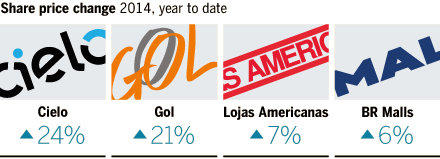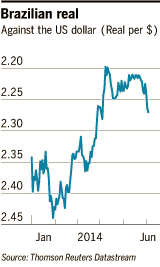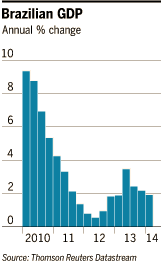Brazil stocks poised for World Cup boost
Roula Khalaf, Editor of the FT, selects her favourite stories in this weekly newsletter.
If you ask the stock pickers, it is official – Brazil will win the World Cup.
Goldman Sachs uses statistical analysis to predict Latin America’s biggest country will come out victorious in the final on July 13 against dreaded rival Argentina.
Brazilian bank Itaú-Unibanco stops short of choosing a winner but has Brazil in the semi-finals while Bloomberg data have Brazil trumping Spain for the coveted trophy.
But the question for investors in Brazil’s stock market is whether they too will be winners when the tournament kicks off next week.
So far, the signs are better than last year – the Brazilian stock market’s benchmark Bovespa index is trading slightly higher than at the end of 2013, when it ceded about 24 per cent of its value.
Whether it can snap last year’s losing streak will depend, however, not only on whether Brazil hosts a successful World Cup but on the months following the tournament, when the country is due to elect its next president.
“I don’t see any downward pressure right now, I think we have already had quite a significant adjustment,” says Joaquim Levy, chief executive of Bradesco Asset Management, or “Bram”, Brazil’s third biggest fund management house, of the stock market.

The market’s more solid start to the year has come in spite of doubts over the strength of the economy. In the first quarter of 2014, growth was a lower than expected 0.2 per cent compared with the previous three months, or 1.9 per cent year-on-year.
This is leading economists to scale back their forecasts for this year. Itaú is predicting GDP will expand only 1 per cent in 2014 from an earlier forecast of 1.4 per cent, citing signs of weak industrial activity, credit demand and business and consumer confidence.

“A broad set of coincident indicators for the second quarter of 2014 . . . points to a retreat in economic activity,” Itaú said.
The World Cup, which starts on Thursday June 12, may benefit some companies, analysts say, such as breweries, with beer production reportedly up 14.75 per cent in May against a year earlier. “There are companies that will profit from the World Cup, such as those that are more related to entertainment and hospitality,” says Bram’s Mr Levy.
Shares of Brazil’s biggest brewer, Ambev, the local arm of Anheuser-Busch InBev, suffered an early hangover in April when the government suddenly announced it would increase beverage taxes before the soccer tournament.
The increase was then postponed until later in the year, allowing Ambev shares to rebound slightly to close at R$16.35 on Tuesday, up about 4 per cent over 12 months.
Airlines were initially expected to benefit as well. Shares of Brazil’s second-biggest airline, Gol, which is a sponsor of Brazil’s national squad, have risen. But the increased tourism travel, with about 600,000 foreigners expected to visit Brazil, would be offset by a fall in domestic business trips, analysts say.
“During the World Cup there will be an increase in the number of flights but this will only be for 30 days. In annual terms it won’t be very significant,” says Lenon Borges, an analyst at Brazilian brokerage Ativa Corretora.
Other consumer-related companies, such as payments group Cielo, or retail companies, such as Lojas Americanas, could temporarily benefit from more footfall in the nation’s shops.
The other benefit to the market could come from positive sentiment if Brazil is able to implement the tournament without any major mishaps. The stock markets of host countries have historically always outperformed slightly in the month following the event, according to the Goldman report.
Similarly, if Brazil wins the tournament, it can expect to outperform in the four weeks after its victory.
But, on average, the outperformance for host and victor alike tends to fade very quickly and often turns into losses. “Sentiment can only take you so far, in markets at least,” the Goldman report said.

Far more important to the medium-term future of the market will be the impact of the World Cup on the popularity of President Dilma Rousseff. Expected to stand for re-election in October, she has become unpopular with investors amid accusations of intervention by her government in petrol and energy prices, interest rates and other sectors.
This has battered the prices of stocks, ranging from state-owned oil company Petrobras and electricity operator Eletrobrás to the largest private-sector groups from miner Vale to Ambev.
In April and May, the market began gaining ground after opinion polls showed opposition presidential candidates chipping away at Ms Rousseff’s still very strong lead. But more recent polls showed the president rebounding.
“If the election looks like it could be slightly in the balance, you will see some volatility returning to the market,” says David Simons, chief executive of brokerage Icap Brasil.
No matter what happens with the World Cup or the election, analysts say Brazil’s economy is large enough to continue to offer interesting market stories even during a slowdown. Education and health stocks remain interesting, says Pedro Fernandes, chief financial officer at Icap Brasil.
Mr Simons adds that Brazil’s high interest rates are offering real returns on government bonds of 6 to 7 per cent. This is attracting all kinds of investors to fixed income-linked products such as asset-backed securities.
“What’s happening here is that fixed income alternatives in this market are quite compelling even for equity investors,” he says.
Comments